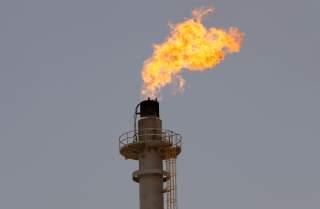Saving Natural Gas through Regulation
Washington should protect the future of the planet and the American economy.
An unprecedented change in U.S. electricity generation is taking place as natural gas is replacing oil and coal, and in some instances, nuclear power. The U.S. Department of Energy forecasts U.S. natural gas production approaching thirty-three trillion cubic feet in 2019 and fueling approximately 36 percent of electricity generation. This is a huge change from just ten years ago. Furthermore, this growth level has occurred with prices hovering around $3.00 per thousand cubic feet, substantially below the price experts predicted.
These numbers should be cause for celebration, but there is a looming problem that may challenge the long-term viability of natural gas. As the industry drills more wells, builds more pipelines, and signs on more customers, emissions of fugitive methane—the primary component of natural gas—are so high that some experts worry that the climate impact of natural gas is nearly as bad as coal.
Why should we care? Aren’t these emissions a small price to pay for the economic benefits that America has reaped from the natural gas boom? Hasn’t this issue been around for almost a decade, as stakeholders fight over whether there should be government regulation?
If you worry about climate disruption—and recent polls show that 70 percent of Americans do—methane is bad for the climate. A unit of methane is equal to about twenty-five units of carbon dioxide. Recent studies have shown that fugitive emissions across the industry are about twice as high as previous estimates. To make matters worse, methane emissions are often emitted with other volatile organic compounds, contributing to smog that chokes many of our cities.
Unfortunately, the Trump Administration seems unmoved by these arguments and appears determined to not only roll back current regulations but also to make it difficult for Environmental Protection Agency (EPA) to regulate methane emissions in the future. Is this another example of the Trump Administration catering to Big Oil? Interestingly, the opposite may be true.
Several weeks ago, ExxonMobil—not known for environmental advocacy—called on the EPA to regulate existing and new sources of fugitive methane. It did so because regulating methane makes good business sense.
If natural gas, rather than oil, is the focus of ExxonMobil’s business strategy, it is important to address the methane problem now and limit the company’s exposure to future legislation that might eventually limit the industry’s license to operate.
Because of technological innovation, abatement costs are low and getting lower, and the methane that would otherwise leak into the atmosphere can be sold at a profit. Further, the company’s timing could not be better. There is growing opposition to natural gas based on the argument that the country should eliminate all fossil fuels. For instance, opposition is strong in New England—as evidenced by the local hostility to all new pipelines. If the industry ignores high levels of methane emissions, it will play into the hands of those who want to eliminate natural gas not in 2070, but in the next ten years.
Finally, Americans support investment in solar and wind generation. If the growth in new investment is to continue, then utility planners need options to provide power when the sun is not shining, and the wind is not blowing. Today the lowest cost option is natural gas-fired power plants. Preserving this option will result in a more reliable power supply and lower cost of electricity.
Natural gas is one of the great energy success stories, but if it is to sustain that success, it will have to improve its environmental record. The best place to start is efficient and fair regulation to bring along all segments of the gas industry to reduce fugitive emissions. It is inexpensive and very doable, and the results will have large environmental benefits. ExxonMobil’s support for continued and expanded federal regulation of methane isn’t just good for climate; it will improve the sustainability of the natural gas industry.
Henry Lee is the director of the Environment and Natural Resources Program at Harvard Kennedy School’s Belfer Center for Science and International Affairs.
Image: Reuters .

